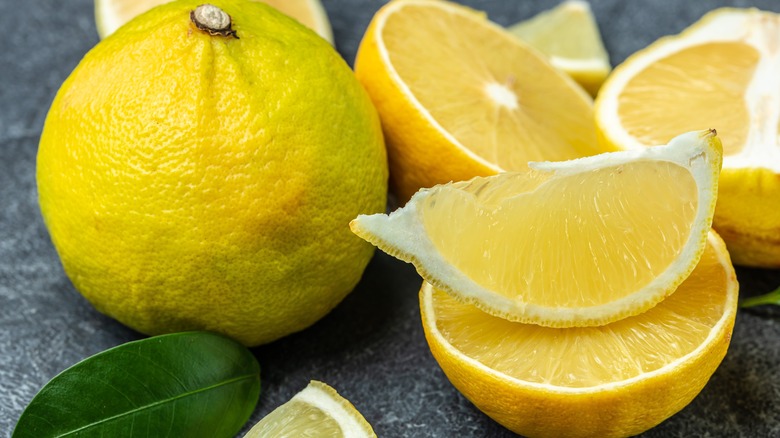The Unique Citrus Fruit That Can Help Lower Your High Cholesterol
When it comes to the topic of heart health, your cholesterol levels mean more than you think. A total cholesterol level of less than 200 milligrams per deciliter (mg/dL) is considered normal, while 200 to 239 mg/dL is thought to be borderline high, and 240 mg/dL or higher is considered high, per UpToDate.
But your "good" and "bad" cholesterol levels matter too. Not all cholesterol in your body is harmful. In fact, cholesterol helps in the production of vitamin D, hormones, and cell membranes. High levels of low-density lipoprotein (LDL), or bad, cholesterol can lead to blocks in your arteries and corresponding issues with heart health, like angina, heart attacks, and stroke, while high levels of high-density lipoprotein (HDL), or good, cholesterol, is often a sign of a lower risk of heart disease. Put quite simply, it's a "hearty" balance of cholesterols that you're after.
Since lifestyle factors, including your diet, play an important role in maintaining healthy cholesterol levels, it's safe to say that there's always interest in new food groups, types, or items people can add to their diet. Cue the bergamot, a yellow-hued citrus fruit from Calabria, in southern Italy, which can help lower high cholesterol. Berga-what? We know, it's not the most popular fruit out there. It's pronounced bur·guh·maat and here's the lowdown on this unique fruit and what it can do for your cholesterol levels.
What is bergamot and how does it lower cholesterol?
Talk about stumbling on a fruit that has the internet talking about it — apparently, lots of people have ended up confusing another citrus fruit called the "kaffir lime," native to Southeast Asia, with the bergamot, even though the former is green in color with a bumpy surface. Bergamot, on the other hand (not to be confused with the bergamot mint herb or bergamot pear), comes from the Citrus bergamia plant and tastes extremely sour. It resembles a round lemon. Because of its unusually sour flavor, it is best enjoyed in tea or as a cooking ingredient. In fact, Earl Grey tea uses bergamot extract for flavoring.
According to clinical trials published in 2019 in Integrative Food, Nutrition and Metabolism, bergamot was found to be effective in reducing total cholesterol levels and low-density lipoprotein cholesterol. A 2021 study published in Nutrients found that bergamot fruit extract reduced overall cholesterol levels by inhibiting cholesterol synthesis and absorption. A 2019 systematic review of several studies published in Critical Reviews in Food Science and Nutrition found that bergamot supplementation was linked with a reduction in total cholesterol, LDL cholesterol, and triglycerides. Triglycerides are a kind of fat found in your body. Too much of this type of lipid is associated with heart disease, stroke, and heart attacks.
Some of the research on bergamot seems to indicate that the fruit's beneficial polyphenols and phytochemicals might be what influence cholesterol levels. The flavanones neohesperidin and naringin, in particular, could be responsible for binding with a cholesterol-producing enzyme called HMG-CoA reductase and interrupting its function.
Should you consume bergamot to lower your cholesterol?
What form of bergamot is most beneficial for lowering cholesterol and in what quantities are not entirely clear in the research. Science has dabbled in bergamot fruit extract, supplements, and juices. The concentration of the fruit's beneficial ingredients will vary significantly depending on what form you consume. Bergamot is also available in oil and powdered form.
That being said, some cardiologists are concerned about the lack of strong scientific proof when it comes to bergamot supplements. The emphasis, they say, should be on following the hitherto proven advice of eating plenty of fiber, cutting out saturated and trans fat, and exercising while combining cholesterol-lowering medications like statins (when recommended by a doctor) to manage your high cholesterol. Focusing on foods to eat and foods to avoid for high cholesterol can be beneficial but so is input from healthcare providers.
There are also potential side effects when it comes to this unique fruit, chief of which is that it can make your skin sensitive to sunlight — 5-methoxypsoralen, a naturally occurring compound found in bergamot, can increase the redness and pigmentary response of UVA light, leading to sunburn and skin irritation. The fruit could also interact negatively with certain medications like antibiotics, diabetes drugs, and even statins. You could have an allergic reaction too and develop skin irritations and difficulty breathing. Bergamot is considered unsafe for children and hasn't been tested on pregnant and/or breastfeeding mothers.
It would seem more research is needed on this relatively lesser-known fruit. Until then, perhaps you'd like to read up on another unexpected fruit that can help lower your high cholesterol.



